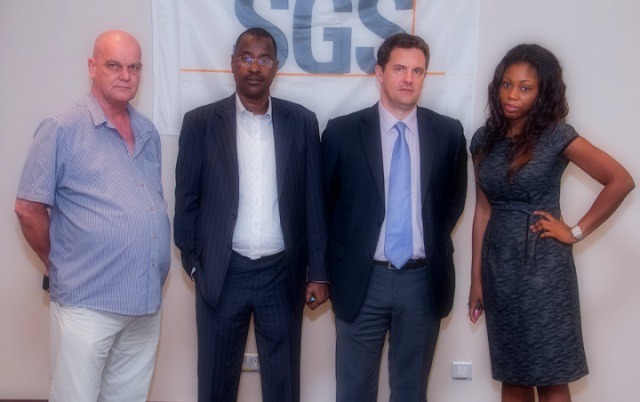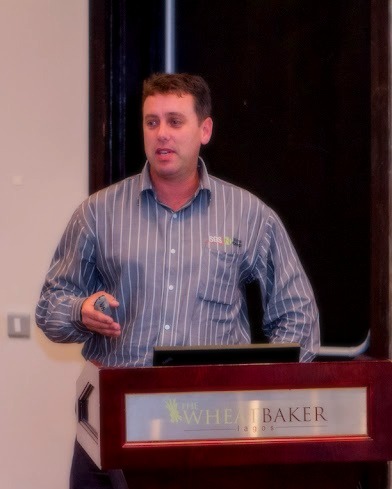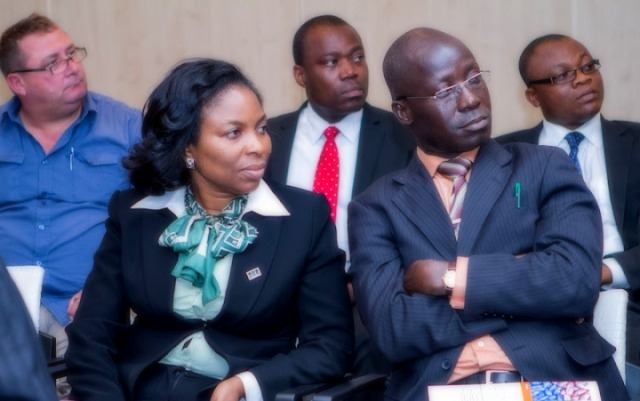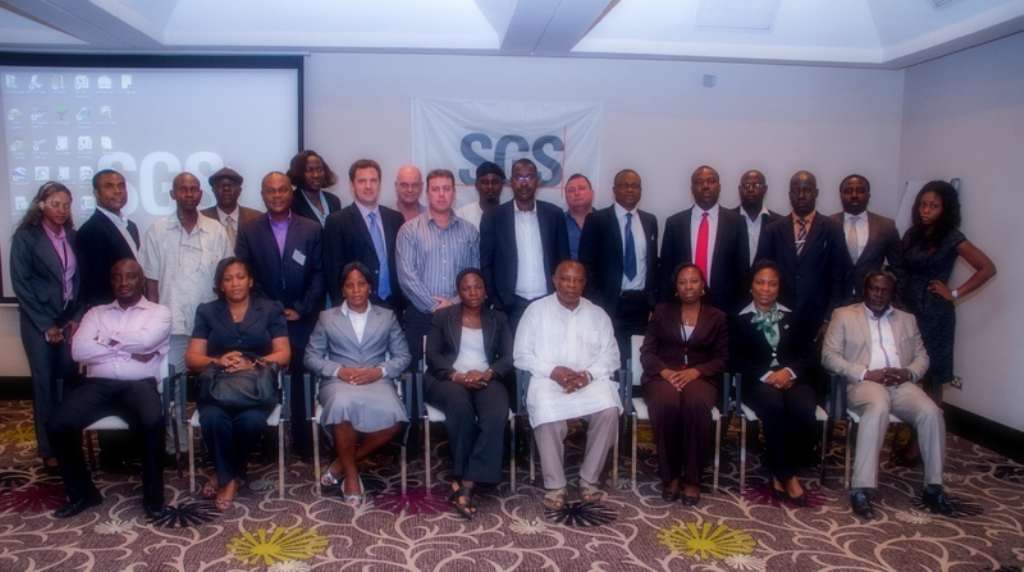SGS Agricultural Experts Reveal Good Agricultural Practices (GAP) to Nigerian Stakeholders

Mr. Trevor Baker, Business Development Manager, SGS Nigeria; Mr. Kaita, General Manager, Dangote Group; Mr. Andrew Jones, Vice President, SGS Africa; Ms. Yewande Kazeem, Project Management, Dangote Group
The attention the current administration is lavishing on the agricultural sector has not gone unnoticed by the world’s leading experts.
Andrew Jones, Vice President of Agricultural Services for SGS Africa, puts it candidly, “When I heard about what President Jonathan and the Agric Minister are doing about agriculture in Nigeria, I called SGS’s Agricultural EVP, Mr. Jeff Newell, and told him SGS has to get involved”.
That phone call led to a series of events that most recently saw SGS fly in its top experts from Johannesburg to Lagos to convene a forum with key stakeholders at the Wheat Baker hotel in Ikoyi.
It is surprising that SGS is not one of those multi-nationals whose name immediately rings a bell, especially when you consider the fact that the company is older than many countries.
SGS is the world’s leading inspection, verification, testing and certification company. It employs over 70,000 employees globally and has 1,350 offices across the globe, including offices and laboratories in 33 African countries.
The company was founded in 1878 as a result of the need to verify grain shipments with the objective of creating transparency in Agricultural trade between the British and France.
Today the company has evolved into ten business lines and is involved in the inspection and verification of just about everything as a result of centuries of building expertise. Agricultural Services, Automotive Services, Consumer Testing Services, Environmental Services, System and Services Certification, Industrial services, Life Sciences, Mineral Services, Trade Assurance Services, and Oil, Gas & Chemical Services are the ten of the company’s business lines.
Governments, financial institutions and leading food and beverage companies rely on the expertise of SGS on a daily basis.
Their clientele for Agricultural Services in Nigeria already includes the likes of Dangote Group, Obasanjo Farms, Folawiyo Farms, Olam Industries, and governments on the State and Federal levels, so when SGS experts decide to host a forum in Nigeria, you can be sure all the attendees present are going to be all ears.
Representatives from Dangote Group, Olam Industries, Zenith Bank Akwa Ibom, Rivers and Ogun State governments, IFC, and other distinguished guests were treated to a ninety minute presentation on global best practices in agriculture.

Mr. Cobus Burger, Managing Director, SGS NviroCrop taking the participants through Good Agricultural Practices (GAP) and Precision Farming Technologies
“Lack of food can cause instability”, says Cobus Burger, the Managing Director of SGS NviroCrop, South Africa. Mr. Burger is one of those experts who just by appearance alone cuts the description of a hands-on expert, and is reputed to be the guru of soil science in Southern Africa. He has a B.Sc. Agric degree with majors in Soil Science and Agronomy. He has worked for a fertilizer company for 13 years and 9 years in the business of precision agriculture for managing sustainability in crop production.
“The average age of the commercial farmer is 56 years. Nowadays people live in urban centers, they buy food but increasingly less amounts of people know how to produce food,” Burger states.
In agricultural economics parlance, the perfect storm occurs when climate change is accompanied by food shortages. Mr. Burger gives the illustration of the heat wave that has held the Midwest of the USA to ransom for the past two weeks. That singular act of nature has driven up corn prices, and affected the global supply and demand chain.
He hazards to guess what would happen in a country like Nigeria that is a net importer of food if such a perfect storm should occur.
One recent example of such a storm was Mozambique in early 2011 where food riots caused instability and reasons for great concern amongst the international community.
MD, Cobus Burger says, “Agriculture stakeholders cannot rely on genetics alone to drive yield. Nutrients are more important. SGS has perfected the art of soil science with global operations in North & South America, Australia, Russia, Europe, and of course Africa. The company understands like many the fact that 60% of all available land in the world for crop production is in Africa. However unlike most, the company has familiarized itself with the cutting-edge technology and Good Agricultural Practices (GAP) required to make the soil work optimally for the people, governments and commercial farmers that require its output to thrive.
“SGS soil science can help dramatically reduce the costs of farming inputs, whilst simultaneously boosting yields and thus increasing profitability and the availability of food. The economics and politics become increasingly better as a country can diversity its economy and keep its people far from hunger. After all world peace cannot be built on empty stomachs.
“Corporate Farming uses economies of scale to produce food in a sustainable way. But with input costs increasing faster than produce prices at ‘farmgate’ level, and consumers demanding to pay less for food products, how can political instability be averted?
“The obvious answer is to reduce input costs. Unfortunately in Nigeria, fertilizers applied are mostly Urea based which can be to your disadvantage. Urea may need to be supplemented with other nutrients,” he adds.
Soil Fertility Services using precision farming technology is the solution to the rudimentary one size fits all approach of blindly applying fertilizer to hectares of land commonly adopted in Nigeria.
Technology like Satellite Imagery that can capture over 360,000 hectares at a go to see or predict productivity on a farm and help design solutions to increase yield. SGS owns the world’s largest independent seed laboratory based in the Midwest of North America.
Apart from Soil Fertility Services, SGS also provides Soil Classification Services to determine amongst other things if irrigation is needed. The company’s experts also help in Managing Soil Life to cut risks in any farming project.
Other Agricultural Services provided by SGS are
- Analytical Services
- Inspection Services
- Pest Control & Fumigation
- Risk Management (for Banks and Financiers)
- Guarantee Services (provided to exporters to cover losses)
- Market Research
- Audit and Sustainability.
When the Namibian government wanted to stop its country from being a net importer of food, it turned to SGS. The company assigned a team of experts to work closely with the government as advisors and also helped the country design and implement irrigation systems. The partnership led to widespread job creation and now Namibia exports foods to neighboring countries like Angola.
“In Kenya SGS was approached to help its small scale farmers in its Coast Province as part of a larger initiative supported by the Danish government. The mandate of this project was to identify why some farmers had a higher yield than others, & what fertilizer protocols could be prescribed that would increase the farmers’ yield.” With Satellite Imagery, SGS was able to determine some areas where the soil is more fertile than others, and where Good Agricultural Practices (GAP) were applied. The company then sent the soil samples to its laboratory in Cape Town, South Africa where it was discovered that some nutrients were needed to optimize yield. By knowing precisely where to apply the required nutrients, the company helped the farmers and government save money on the inputs, boost their yield and increase the overall return on investment for the project.
Ibrahim Suleiman, a Business Consultant with SGS, says the aim of SGS is to “encourage farmers to export, embrace mechanized farming, adopt new technologies, reduce costs and reap harvests multiple times a year. We envision a time where the earnings from Agriculture will be more than oil”.
In a country like Nigeria where billions of dollars are made from crude oil with the stroke of a pen, it’s difficult to imagine such a scenario. However with the interest of the Nigerian government and expertise of SGS in Good Agricultural Practices (GAP), there is hope lying across the horizon.











DD
July 27, 2012 at 12:17 pm
What is their contact details? Why is it that Nigerian News media never leaves a contact detail on things like this?
tajshah
July 27, 2012 at 4:03 pm
i m farmer my name is taj pl kindly help me i want new method in farming agriculture ,i need sponsorship bcz i m tail farmer we ahve not water but i m fighting for my rites i can share my view regading that wot is rigths of farmer on govt